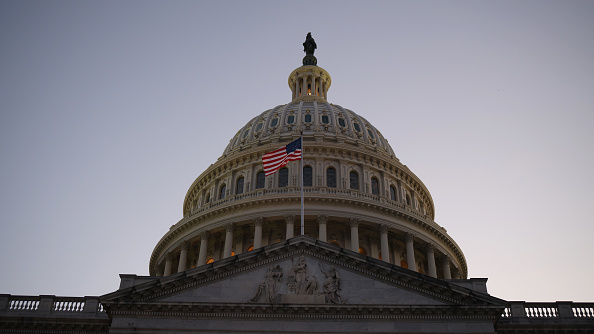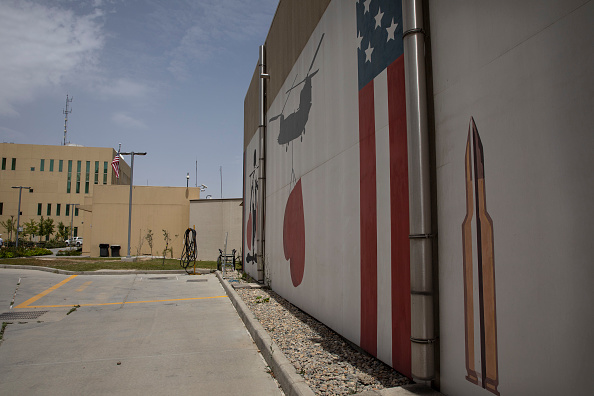
The U.S. Capitol Dome in Washington, D.C., August 02, 2021. /Getty
The U.S. Capitol Dome in Washington, D.C., August 02, 2021. /Getty
Editor's note: Hamzah Rifaat Hussain is a former visiting fellow at the Stimson Center in Washington and serves as assistant researcher at the Islamabad Policy Research Institute (IPRI) in Pakistan. The article reflects the author's opinions and not necessarily the views of CGTN.
As violence soars in Afghanistan resulting in mass civilian casualties, the Biden administration's Kabul policy continues to be in a perpetual state of confusion. From strikes and counter strikes between the government and Taliban forces to an exodus of Afghan refugees heading towards Europe and the Americas, this latest tilt can ignite a tinderbox in the absence of peace with fighting in Kandahar, Herat and Lashkar Gah being complimented with a "do" and "do not" strategy.
It hinges on the fallacy of acknowledging domestic variables and charting out military strategies, which has resulted in the exasperation of tensions between rival factions despite cautious optimism from the Doha meet recently. Given what is unfolding, the question for policymakers remains: Can Afghanistan once again afford such dilly-dallying from Washington?
In a visit to India to promote the Indo-U.S. strategic partnership, U.S. Secretary of State Antony Blinken hinted at how China's interests in Afghanistan are potentially positive given the latter's relentless pursuit of an all-inclusive political solution with no givers or takers in the conflict. The truth is that an all-inclusive political settlement is the only solution in the absence of dualistic approaches on the Afghan question.
Note that overt claims of hands-off approach on Afghan affairs have coincided with aerial and logistical support to the government forces against the Taliban, which provides the latter with more of a justification to carry out horrendous attacks. A complete withdrawal of U.S. forces was the premise upon which peaceful negotiations were to take place. A spike in aerial strikes however, goes against that principle.
This is not about giving a clear pass to violence in Afghanistan but the duplicitous approach being adopted of overtly championing strategies of troop withdrawals while keeping a close eye on Afghan dynamics and charting out ensuing military strategies. No one is contesting the fact that violence must cease for everlasting peace to materialize but this cannot be achieved through hypocritical military engagements complimented by endorsements of neutrality.

Murals are seen along the walls at the U.S. embassy in Kabul, Afghanistan, July 30, 2021. /Getty
Murals are seen along the walls at the U.S. embassy in Kabul, Afghanistan, July 30, 2021. /Getty
Afghan public opinion reflects this sentiment with large queues of asylum seekers and refugees claiming that their future is being threatened by both the Taliban and the Afghan government with violence resulting in a spike in civilian casualties. With the U.S. providing aerial support to one of the stakeholders, Washington is quintessentially becoming a party to the conflict instead of a neutral player. The end results will be harrowing in the form of impending regional instability, more defiance on part of parties to the conflict to not return to negotiations and casualties en masse.
With nations in close proximity to Afghanistan understanding that such myopia would impact their domestic landscapes, countries such as Pakistan are touching the other side of the coin. Islamabad has insisted that complete detachment from Afghan affairs by the Biden administration will only result in the mushrooming of terrorist outfits such as al-Qaeda which have transnational, eclectic and apocalyptic ideologies and orientations which are aimed at the destruction of human civilization and pose an existential threat to global peace.
The U.S. policy, however, is not directed at countering terrorism which includes the Islamic State of the Khorasan Province alongside al-Qaeda operatives but bombarding a stakeholder in the peace process which was formally part of the Doha Peace plan. Such U-turns only serve to contribute towards the saddening plight of Afghan civilians while dampening future prospects.
Kabul requires an approach grounded in the pursuit of facilitating dialogues by all major capitals, while quietly relaying concerns to aggrieved parties to shun away from dangerous tactics which could imperil peace and security. That is precisely what China managed to elicit from the Taliban in talks recently, with the latter reciprocating the gesture as Mullah Abdul Ghani Baradar provided assurances that any forces will not be allowed to use Afghan soil to attack China. Again, this is not about catering to one party at the expense of the other, but approaching the Afghan situation through wisdom and precision instead of active military engagement.
Lack of clarity on the Afghan situation is eerily similar to U.S. Secretary of State Antony Blinken's mixed signals on cooperation between like-minded democracies in India while censuring New Delhi for democratic backsliding at the same time. Confusion or duplicity on Afghanistan, however, will not result in a decline in violence nor contribute towards peace.
(If you want to contribute and have specific expertise, please contact us at opinions@cgtn.com.)

